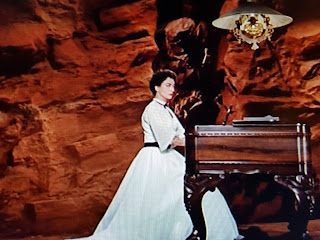Most of us probably imagine the movies of the 1950s to be more sexist, more ageist, than the, admittedly far from perfect, films we enjoy now. So it's interesting to note that in 1954, the year Johnny Guitar was made, Joan Crawford celebrated her 50th birthday whilst those competing for her romantic attention in this film were either twelve years younger than her (Sterling Hayden in the titular role) or born more than two full decades later (Scott Brady as The Dancin' Kid). Instructive also that this is not once considered worth mentioning.
Admirable though this proto-feminist casting is it's merely one of many things to admire about Johnny Guitar. Not least Crawford's performance. She plays Vienna who runs a curiously empty saloon in a windswept Arizona frontier town. The only liquor she seems to stock seems to be unlabelled whiskey bottles and the roulette tables often spin but nobody ever seems to play them.
She's ostensibly waiting for the railroad to come through town, biding her time before she can hit paydirt serving travellers and those moving out West. The threat of new people, strangers, from the East, moving into town - and changing it - isn't going down well at all with some of the locals. Not least Mercedes McCambridge's Emma Small, all gimlet eyes, repressed passions, and petty vengeances.
The most reliable customers at Vienna's are a motley, if well drawn, crowd of ne'er-do-wells whose source of income is dubious to say they least. The gang leader goes by the name of The Dancin' Kid and handsome though he is it's never exactly clear why he's leading these outlaws.They claim to work in an unspecified silver mine. Emma and the town elders suspect they rob stagecoaches. Emma also suspects, through motives of her own, that Vienna is in league with them.
Sterling Hayden, on occasion, runs the risk of being acted off the screen by his horse. This doesn't matter as much as it should. An advantage, perhaps, of playing the strong silent type. His Johnny Guitar has been called to the saloon by Vienna to act as protection and it soon becomes clear that they were, a lustrum back, romantically involved.
The Dancin' Kid and Johnny Guitar have an uneasy relationship. Both looking to win Vienna's heart. Both sharpshooters with itchy trigger fingers and fully aware that the emotionally mature Vienna won't be impressed by such macho shenanigans.
So, despite the horses, gunfights, bank jobs, and Monument Valleyesque backdrops, it's essentially a love story. A love story dressed up in its finest Western wear and cowboy boots and finished off with some pretty fierce looking spurs.
What it also is is a damned fine caper. The chases are gripping and because the foundations of the character development have been laid so incrementally and delicately you find yourself rooting for different people at different times. It's been called a psychological Western and that doesn't seem an unfair description.
Crawford's Vienna's tough exterior hints at a back story of pain and rejection. The toughened up independent woman she has become, however, is still humane enough to see the best in people. She can even understand that Emma's vindictiveness arises from barely understood passions bubbling up inside her. Not least when The Dancin' Kid is about.
The Kid's gang are a wonderfully disparate bunch. From young Turkey (Ben Cooper), a boy playing a man's game with no idea just how severe the consequences could be, to loyal sidekick Corey (Royal Dano), and loose cannon Bart (Ernest Borgnine) who doesn't trust women, other men, or even horses it would appear.
Sometimes the film has its bean chowder and eats it. Whilst, in many ways, refusing to pander to easy signifiers of good and evil, the director Nicholas Ray (perhaps most famous for Rebel Without A Cause) uses the plot device of a funeral to kit out an outraged posse in black clothes. When they burst into Vienna's she is, of course, clad in a pure white outfit that makes her look like a model for an early Whistler painting.
There are a couple of wonderful set pieces but the tension grips you from start to finish, aided and abetted by Victor Young's brooding score. I left the BFI keen to learn more about this curious genre they called the psychological Western. I left the BFI wondering, when they dig up such long forgotten treats as that, why I don't go more often. I left happy.








No comments:
Post a Comment